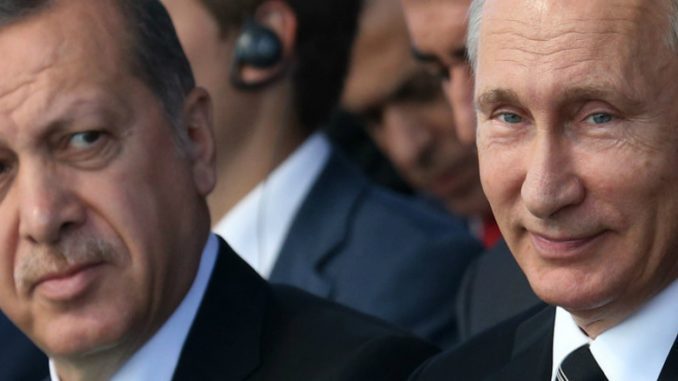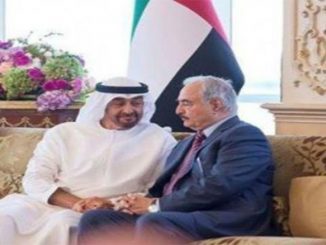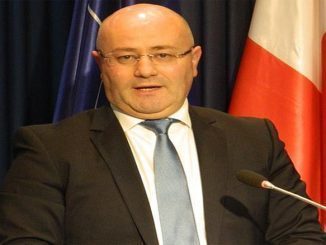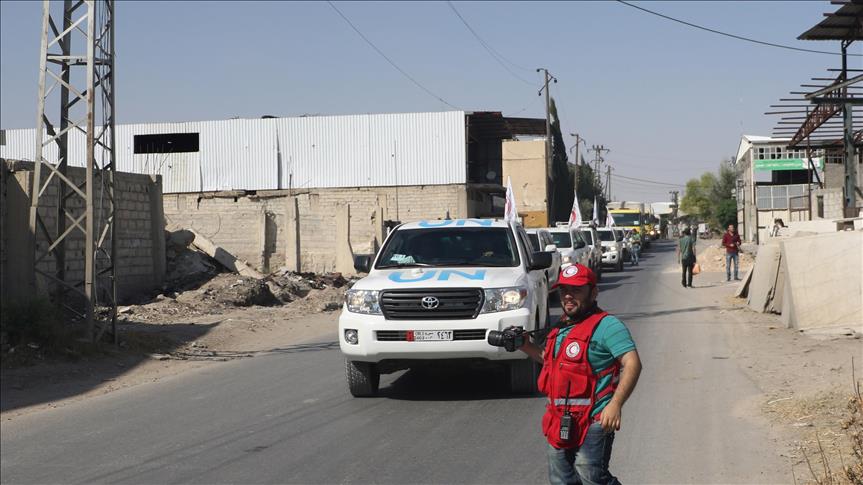
Turkey’s military has denied Russia’s claim in killing three Turkish soldiers by mistake in Syria, opening the door for possible Russian warning to Turkey over making new ties with the US after a recent Trump-Erdogan phone call.
A Russian warplane hit a building housing Turkish soldiers in Al-Bab at 8:40 am local time, the Turkish General Staff said in a statement.
“During an operation by a Russia Federation warplane against Islamic State targets in the region of the Euphrates Shield operation in Syria, a bomb accidentally hit a building used by Turkish Army units,” the statement said.
Russian President Vladimir Putin was quick to call his Turkish counterpart, Recep Tayyip Erdogan, to offer condolences after Thursday’s air strike, which also wounded 11 Turkish soldiers.
Kremlin spokesman Dmitry Peskov told reporters the pilots were killed due to lack of coordinate.
“Turkish servicemen were killed as a result of incoordination in Russian Air Force airstrikes against terrorists during the joint operation to liberate al-Bab,” Peskov said.
“Our military were guided by coordinates that had been handed over by Turkish partners,” Peskov added.
Turkey’s Deputy Prime Minister, Numan Kurtulmus, meanwhile said the air strike was still being investigated.
“According to initial information we received, it is a total accident,” he was quoted as saying by the state-run Anadolu news agency. “But how it happened and how the coordination was miscalculated will be clarified.”
However, the Turkish military insisted the troops had been at the building for 10 days and that Russia had been advised of their position on Wednesday.
The Turkish military subsequently issued its statement challenging Peskov’s account and stressing that the soldiers’ position had been communicated the previous day to both officers at Russia’s Hmeymim airbase in Syria and the Russian military attache in Ankara.
A possible warning
On November 2015, the Turkish Air Force shot down a Russian Su-24 bomber it said had crossed into Turkish airspace, though Moscow denied that happened.
Russia imposed a wave of economic sanctions against Turkey in response to the incident. However, the two countries have since repaired relations.
Turkey has left the US side turned to Russia after the failed coup attempt, which was suspected to be organized by US and European agents, and sought to repair their bilateral relations.
Russia and Turkey have backed opposing sides in the Syrian crisis but they started cooperating to achieve mutual interests.
Turkey became one of the peace guarantees in Syria along with Russia and a part in securing a suitable environment for the political process that will end the crisis.
Together, they worked on ending the US ambitions in Syria by sidelining it from the political process and reducing its military efficiency in fighting ISIS after joint operations near al-Bab city.
However, Erdogan had recently a phone call with Trump and discussed together the possibility of new cooperation and mutual military operations against ISIS in Raqqa, a move that may have angered Russia and made it target the Turkish soldiers as a warning.
Erdogan-Trump joint goals
Recep Tayyip Erdogan, Turkey’s president, raised the battle for al-Bab in a telephone conversation with Donald Trump on Tuesday.
Turkish officials said that Erdogan urged the US president to curb Washington’s support for Syrian Kurdish militia, known as the YPG, and cited Turkish progress in al-Bab to argue it would be a better partner in the fight for Raqqa.
The White House said that in the phone call, Trump spoke about the two countries’ “shared commitment to combating terrorism in all its forms” and welcomed Turkish contributions to the fight against Islamic State. But it gave few details.
Sources in Erdogan’s office said the two leaders had touched on issues including a “safe zone”, as well as the regional migrant crisis and the fight against terrorism. Turkey has long advocated a secure zone for displaced civilians in Syria threatened by Islamist militants or forces fighting for Syrian President Bashar al-Assad.
They also said Erdogan had urged the United States not to support the Syrian Kurdish YPG militia and that new CIA Director Mike Pompeo would be in Turkey on Thursday to discuss that and other issues with Turkish counterparts.
There was no immediate confirmation from Washington of Pompeo’s visit. But the offices of both leaders said Trump had reiterated U.S. support for Turkey “as a strategic partner and NATO ally” during Tuesday’s phone call.
During a televised interview, Presidential spokesperson İbrahim Kalın confirmed that an agreement was reached between both President Erdoğan and Trump on the need for increased cooperation against ISIS, and that Ankara has proposed a detailed road map to Washington on a possible operation against the ISIS stronghold Raqqa, and that discussions are currently underway.
Kalın also added that Ankara communicated its concerns over issues left behind by the Obama administration (FETÖ and support to the PKK-affiliated YPG), and that Trump responded that these issues are being dealt with by the relevant units in his administration.
Next goal: Raqqa, US cooperation needed
The Euphrates Shield Operation has made important progress in capturing al-Bab and the next target will be the Syrian city of Raqqa, the de facto capital of the Islamic State (ISIS), Turkish Foreign Minister Mevlüt Çavuşoğlu has said.
“For this reason, the al-Bab operation should be completed as soon as possible. In recent days, our special forces, our troops and the soldiers of the Free Syrian Army have made serious progress. The air support from the coalition and Russia’s operations against ISIS have also contributed to this. We want to complete this operation as soon as possible,” Çavuşoğlu said.
He reiterated Ankara’s position that members of the U.S.-led anti-ISIS coalition could send special operations teams to seize Raqqa from ISIS without relying on the Syrian Kurdish Democratic Union Party (PYD), Washington’s main local ally against ISIS but a group detested by Ankara for its ties to the outlawed Kurdistan Workers’ Party (PKK).
However, the presence of Kurdish militias may complicate the mission.
The Syrian Democratic Forces (SDF) alliance, which is dominated by the Kurdish YPG militia, is supported by the US as the latter uses them in its war against ISIS.
The SDF, backed by US coalition, launched a campaign with the ultimate aim of capturing Raqqa in November. The first two phases focused on capturing areas to the north and west of Raqqa, part of a strategy to encircle the city.
The first phase was pushing from the north. The second one was pushing from the west. And now, in the third phase, the forces are trying to push from the east.
The U.S.-led coalition fighting Islamic State has boosted support for its Syrian allies, supplying armored vehicles for the first time as they prepare for a new phase in their campaign, a move that angered Ankara.
However, the latest developments between Erdogan and Trump might make Turkey’s goal easier, as Trump has no real interest in backing the Kurds other than accomplishing his goals in fighting ISIS.
Turkey has presented a detailed plan to drive ISIS out of its Raqqa stronghold in northern Syria and discussions on the issue are underway. The plan envisages military incursions by the Turkey-backed FSA to take control of Raqqa, as a replacement for the SDF.



